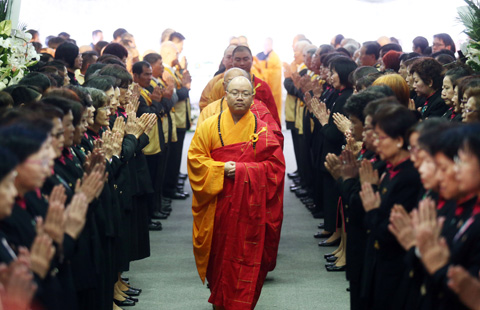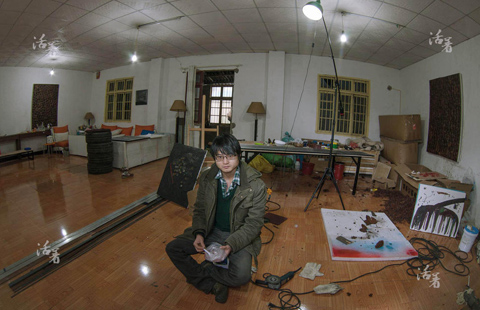Qualcomm fine may affect trade talks, increase tensions: analysts
Updated: 2015-02-11 11:34
By Paul Welitzkin in New York(China Daily USA)
|
||||||||
The decision by Qualcomm Inc to pay a record $975 million fine to settle an investigation by a Chinese regulator may increase trade tension with Washington and affect negotiations on a key trade pact in the Asia-Pacific region analysts said.
On Monday, San Diego-based Qualcomm agreed to pay the largest corporate fine ever in China, ending a 14-month investigation into anti-competitive practices by the country's National Development and Reform Commission (NDRC). The "unfair" and "excessively high" royalties Qualcomm collected from Chinese smartphone makers were the key factors that led to the historical fine, the NDRC said.
"The settlement is likely to add to the trade tension between China and the US and may also complicate the negotiations on the Trans-Pacific Partnership. One of the issues that have bogged down the TPP negotiations is the objection by some developing countries to US insistence on stringent rules for the protection of patents.
"I suspect that the US negotiators are trying to prevent any potential TPP partners from using anti-trust rules in their future bargaining with US multinationals," said Talian Chi, professor and Carl A. Scupin Faculty Fellow at the University of Kansas School of Business, in an e-mail to China Daily.
The Trans-Pacific Partnership (TPP) is a free- trade deal between the US, Canada, and 10 countries in the Asia-Pacific region (not including China) that's been under discussion.
However, Robert Atkinson, president of the Information Technology and Innovation Foundation think tank in Washington, said the Qualcomm case could end up boosting the TPP.
"If anything this and other similar actions by the Chinese government will increase support (for TPP) because it will be seen as a way to better exert pressure on China to curtail these kinds of practices that discriminate against foreign firms. For overall bilateral US-China relations, this action will only heighten the concerns held by the US government over discriminatory Chinese economic policies," he said in an e-mail.
Atkinson said there is no evidence that Qualcomm committed any violations. "China's anti-monopoly law is not only quite flexible, allowing the government a great deal of leeway that other nations' competition authorities do not have, it is also unique in treating intellectual property as a form of monopoly. No other nation has brought a similar action against Qualcomm, which practices the same licensing business model around the globe. So Qualcomm essentially has no choice but to pay the $975 million if it wishes to continue to sell to the growing Chinese wireless market."
"Any firm possessing proprietary technology has monopoly power, but such monopoly power is often protected by the government under the patent system," said Chi. "Given the monopoly status of Qualcomm over its technology, the negotiation of the licensing fees is inevitably subject to its bargaining power relative to that of its Chinese licensees. The governments of some developing countries do try to boost the bargaining power of their domestic firms by limiting the maximum royalty rate in licensing contracts via domestic legislation. This type of government policy is unlikely to work for a small country, but China is the largest cell phone market in the world and is thus better able to get concessions from foreign firms though such policies."
Qualcomm will also offer licenses to its current 3G and 4G Chinese patents separately from licenses of its other patents, and it will provide patent lists during the negotiation process. Qualcomm also said it plans to continue to grow its investments and expand collaborations in China, including with China's mobile operators, handset and device suppliers, and within the Chinese semiconductor sector.
Chi said the Chinese government may be trying to alter the balance of bargaining power between Qualcomm and its Chinese licensees. "The healthcare authorities of many Western European countries have been able to negotiate lower prices for patented drugs with multinational pharmaceutical companies, but the use of antitrust rules to get lower prices of patented technology for domestic producers seems to be a novel strategy," he said.
Atkinson said the Chinese government has long been concerned with the amount of money Chinese companies pay to foreign firms to license their technology, despite that China runs a big trade surplus with the rest of the world. "It (Chinese government) has sought ways to reduce these payments which it views as fundamentally unfair. The NDRC has used the anti-monopoly law as a way to force concessions from Qualcomm in future licensing terms. This not only will help domestic Chinese competitors, it will at the margin reduce Qualcomm's competitive position."
paulwelitzkin@chinadailyusa.com
(China Daily USA 02/11/2015 page1)

 10 destinations favored by Chinese property investors
10 destinations favored by Chinese property investors
 Spring Festival goods in the making
Spring Festival goods in the making
 New Year scenes preserved in old photos
New Year scenes preserved in old photos
 Remembering the dead on the seventh day after TransAsia crash
Remembering the dead on the seventh day after TransAsia crash
 A homeward bound motor "gang"
A homeward bound motor "gang"
 Farmer builds sports car out of wood
Farmer builds sports car out of wood
 Bleak outlook for art students six months after graduation
Bleak outlook for art students six months after graduation
 US launches drive to save monarch butterfly
US launches drive to save monarch butterfly
Most Viewed
Editor's Picks

|

|

|

|

|

|
Today's Top News
President Xi to visit US in September
Study sees consumer confidence faltering
NBC News anchor Brian Williams suspended
US confirms death of IS-held hostage
High royalties key reason behind Qualcomm fine: NDRC
Net regulator to meet US ambassador on WeChat
The peeping eyes of the United States
January inflation cools to 0.8%
US Weekly

|

|







